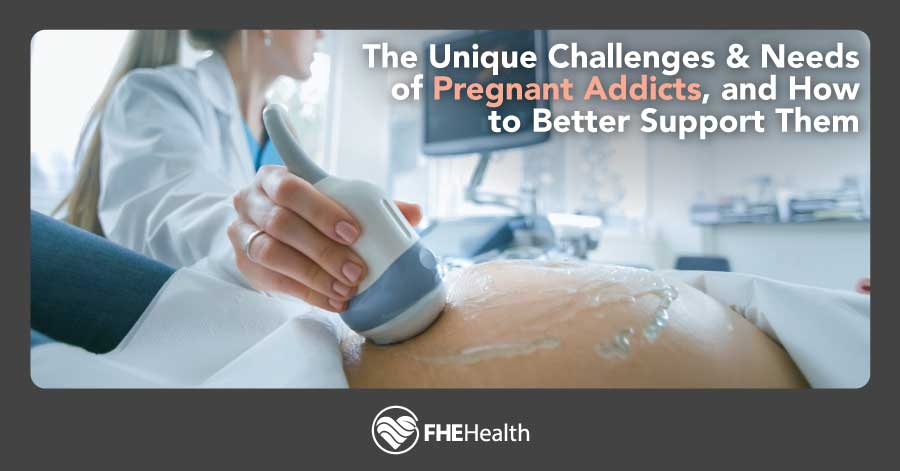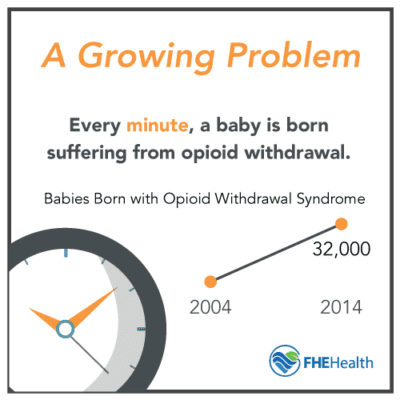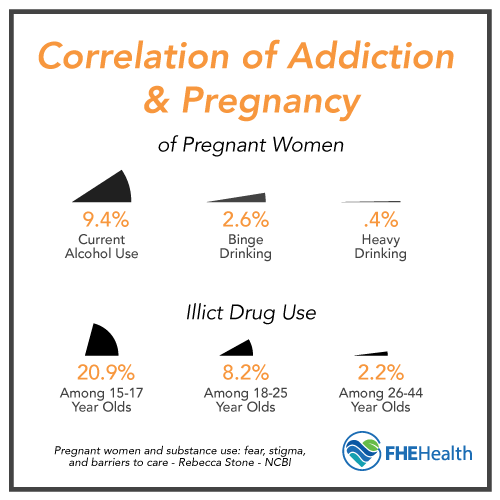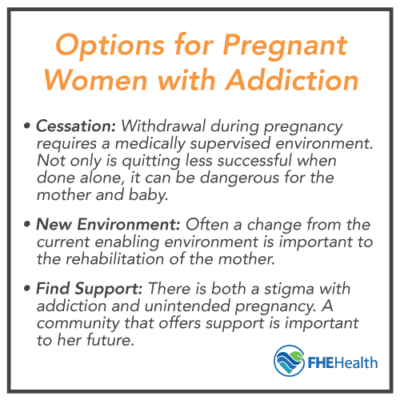
Substance abuse during pregnancy is a devastating problem for many people today. The National Institutes on Drug Abuse believe about 5 percent of pregnant women use some type of addictive substance during their pregnancy. Many of these mothers simply cannot stop their addiction due to the chemical dependency the substances cause. The results can bring devastating changes to the health of the child and the mother in the long term.
Yet many people don’t recognize why women are getting pregnant while they are addicted to substances. In many situations, this occurs not as a result of making the decision to live an unsafe and unpredictable lifestyle but as a result of being unable to break away.
How Many Babies Are Born Addicted?
 Drug addiction in pregnant women is a worrisome occurrence due to the health complications it can cause. The National Institutes on Drug Abuse provide some startling facts.
Drug addiction in pregnant women is a worrisome occurrence due to the health complications it can cause. The National Institutes on Drug Abuse provide some startling facts.
- Every minute, a baby is born suffering from opioid withdrawal.
- In 2014, 32,000 babies were born with opioid withdrawal syndrome, a five-fold increase from 2004.
The problem doesn’t end at birth. Many times, these children end up in the foster care system, taken from mothers who are unable to care for the child. About a third of children who enter the foster care system do so as a result of drug abuse by a parent, according to data from 2016 reported by The Atlantic.
What Is Causing Pregnancy and Addiction?
 A variety of factors cause a pregnancy to be more likely for women who have an addiction than in those who do not.
A variety of factors cause a pregnancy to be more likely for women who have an addiction than in those who do not.
One of the key reasons these women may become more prone to pregnancy is the inconsistency of control in their lives. Again, the blame here doesn’t lie on the individual but rather on the disease she is battling daily to control. That lifestyle, though, leads to times when it is very hard for the woman to control what’s happening around her. Inability to maintain a birth control regimen and an increasingly seedy social circle may create unintended or unwanted sexual encounters.
Kari Ann’s story is typical. Facing ongoing drug abuse, she simply couldn’t keep things in her life straight, leading to missing her birth control prescription. She became pregnant unexpectedly in the midst of using illicit drugs. She took the steps she could to stop using while pregnant, had her child and did her best to control her addiction in the years to follow. One day, however, she blacked out, only to wake up with a man on top of her and no idea who he was. This type of unpredictable lifestyle causes a pregnancy to occur even in those trying to make better decisions.
What Are the Medical Dangers of Drug Use While Pregnant?
The outcome to the baby from drug use during pregnancy depends on factors such as the amount and frequency of substance use and the type of substance being used. Consider some of the most common risks as noted by the National Institute on Drug Abuse.
Stillbirth
Stillbirths are one of the biggest risks to babies born to mothers who have an addiction. When there is any evidence of stimulant, marijuana or prescription pain reliever use in the mother during pregnancy, the risk of stillbirth is 2.2 times more likely. It is 2.3 times more likely when the mother uses marijuana significantly. Tobacco use can increase this by 1.8 to 2.8 times.
Withdrawal
Many mothers cannot stop taking drugs once they become pregnant, even if they want to, due to the overwhelming pain and discomfort caused by withdrawal. Those same symptoms and withdrawal discomforts occur in children who are born addicted. This may create risk factors for:
- Diarrhea
- Fevers
- Hyperactive reflects
- Increased muscle tone
- Blotchy skin color
- A high-pitched cry
- Seizures
- Slow weight gain
- Sweating
- Trembling and much more
Other Long-Term Effects of Drug Use on Babies
Other complications, sometimes severe, can arise, such as:
- Birth defects
- Low birth weight
- Small head circumference
- Premature birth
- Sudden infant death syndrome
Pregnant and addicted mothers who want to make a change can get help. The sooner you reach out for help, the less likely it is your child will suffer.
What Options Are Available to Mothers?
Many women understand the effects of drug abuse on pregnancy, yet they don’t know what options are available to them. A mother with an addiction may fear going to prenatal care because they are worried about blood tests that could indicate their drug use, instantly labeling their pregnancy as high risk.
If the mother goes to a hospital to give birth, she may end up losing her child if she has illicit drugs in her system at the time of delivery. Some mothers simply refuse to get the care they need as a result of this fear.
It is not uncommon for social workers to remove children from the homes of mothers who continue to use drugs after pregnancy, either. This can create a devastating outcome for all involved.
What can be done, then, to support women facing this type of hardship?
Understand the Unique Needs of Pregnant Women with Addiction
 Prenatal appointments are critical for women who are in this situation to ensure the pregnancy is healthy for you and to provide your unborn child with the care they need to avoid the worst outcome.
Prenatal appointments are critical for women who are in this situation to ensure the pregnancy is healthy for you and to provide your unborn child with the care they need to avoid the worst outcome.
Women who are pregnant may be able to get help to stop using. There are some medications that may allow for an easier withdrawal process from opioids, for example. If given safely to pregnant women in a controlled situation, it may be possible to reduce some of the withdrawal symptoms, making it possible to get help.
Also, it’s critical for women who are going through withdrawal to have enough medical supervision during the process. Because this can create a devastating outcome with challenges to both the mother’s and the baby’s health, doctors should be on hand.
Removal from Challenging Situations
In some cases, the biggest factor preventing addicted women from not using is their environment. This may mean there is a need to enter a detox and inpatient treatment program when possible to get immediate help. It may mean moving across town or into a nearby city with a friend until you can remove the risk of using again.
What Help Is Available?
Women facing this unique challenge need to seek help. More opportunities need to be created to provide that help. Nonprofit organizations need funding in order to create a safe place for women who are pregnant to detox and get prenatal care, even though they may still be using. These women also need support of those around them to get clean.
There’s a stigma assigned to addicts in general, which is much worse for pregnant addicts. By working to remove that stigma and to see addiction as what it is — a disease that needs professional medical treatment — it is possible to provide more support, funding and opportunities for women in this dire situation.
Seek Out Care at FHE Health
Drug and alcohol rehabilitation can happen when a woman is pregnant. We can help you by providing a safe, compassionate environment for you to get sober. Contact FHE Health today to learn more about drug addiction and recovery from our trusted team. Call us at (833) 596-3502 for a private, no-obligation consultation.






